Ultimate Tanzania
- Kandoo Multi-activity
- Kandoo Trekking
- Kandoo Summits
- Kandoo Ultimate
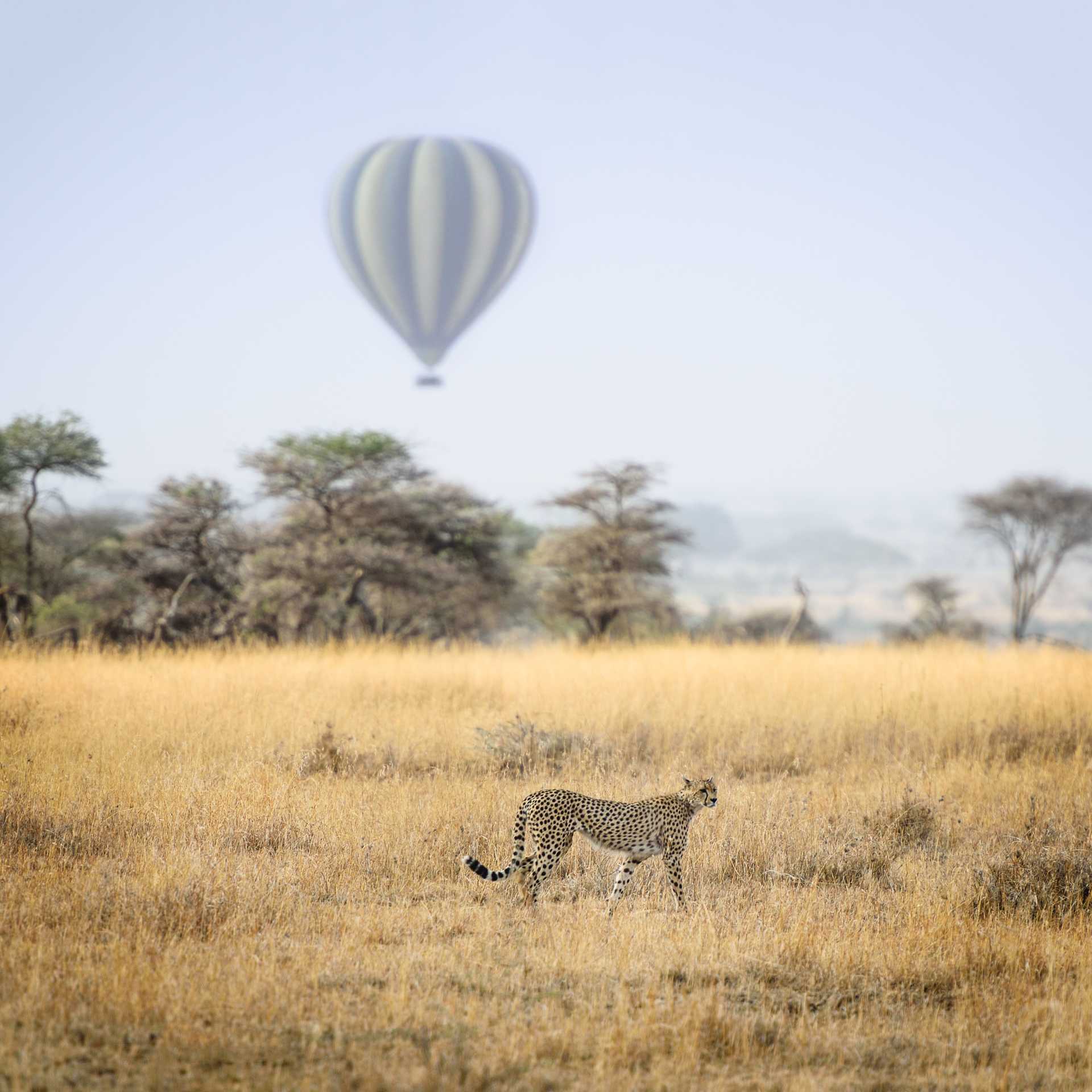
Contact
our UK team
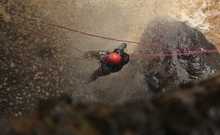
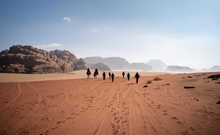
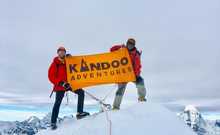
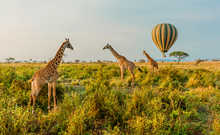
All trekkers need to organise their own flights to Kilimanjaro International Airport (JRO). From JRO we will arrange a private transfer to your hotel. That night or early the next morning you will meet your local Kandoo representative and have a full pre-climb briefing.
Transfer from your hotel to Machame Gate for registration. Our porters prepare and pack our supplies and luggage before we start our ascent along the forest trail to Machame Camp at 3000m. We will stay here overnight.
After breakfast we start walking, leaving the rainforest behind, and continue our ascent, crossing a small valley and up to a steep rocky ridge, covered with heather. Our route now turns west into a river gorge until we reach Shira Cave Camp. It will be colder tonight than the previous night with temperatures possibly falling below freezing.
Today we will climb up to 4600m to the base of the Lava Tower for lunch and acclimatisation. This will be our toughest day so far and you may, for the first time, feel the altitude. After lunch we will descend again by almost 650m to Barranco Camp, following the ‘walk high, sleep low’ golden rue of acclimatisation. Our descent to Barranco Camp takes about 2 hours and offers great opportunities to take some beautiful photographs of the Western Breach and Breach Wall. The camp is situated in a valley below the Breach and Great Barranco Wall.
A short, but fun, day starting with a scramble to the top of the Great Barranco Wall. We then traverse over scree to the Karanga Valley (3930m) beneath the icefalls of the Heim, Kersten and Decken Glaciers. We will stay overnight at Karanga campsite.
We leave Karanga campsite behind to meet the junction connecting with the Mweka descent trail. From here we continue up to Barafu Camp. Here we can rest, enjoy dinner, and prepare for the summit day. The camp offers amazing views of the summit and the two peaks of Mawenzi and Kibo.
You will be woken around 23:30 with tea and biscuits. We start our trek to the summit between the Rebman and Ratzel glaciers through heavy scree up to Stella Point on the crater rim. This is the most mentally and physically challenging part of the trek. At Stella Point (5732m), we will stop for a short rest and hopefully be in time to witness the magnificent sunrise (weather permitting). We are now only an hour away from the summit, Uhuru Peak (5895m), the highest point on Mount Kilimanjaro and the continent of Africa. From the summit, we descend down to Mweka camp site, via Barafu Camp for lunch. Trekking poles will be needed for the loose scree going down to Mweka Camp (3100m). Later in the evening, we will enjoy our last dinner on the mountain and a well-earned sleep.
Your final day on the trek, departing after breakfast we descend a further 1300m to the Mweka Park Gate to pick up your summit certificates from the Park Headquarters. Transfer to your hotel.
You will be met by your guide and vehicle and driven to Lake Manyara, arriving with plenty of time for an afternoon game-drive. Located beneath the cliffs of the Manyara Escarpment, on the edge of the Rift Valley, Lake Manyara National Park is famous for its large alkaline soda lake which is home to the pink flamingo, yellow-billed stork and heron. If you are lucky you may get chance to see the tree climbing lions, which are unique to this national park. Watch out for some fun antics from the local baboon population; Lake Manyara is believed to have the largest number of these primates in the World! We then stay the night at a beautiful Safari Lodge in Karatu.
After breakfast, you will take a picnic lunch with you as you continue to the Serengeti, a drive of around 4 ½ hours through the Ngorongoro Conservation Area. Your journey will take you to the Olduvai Gorge, where the Leakeys discovered the hominoid remains of a 1.8 million year old skeleton of Australopithecus boisei, one of the distinct links of the human evolutionary chain. In a small canyon just north of the Ngorongoro Crater, the Leakeys and their team of international archaeologists unearthed the ruins of at least three distinct hominoid species, and also came upon a complete series of hominoid footprints estimated to be over 3.7 million years old. Evacuated fossils show that the area is one of the oldest sites of hominoid habitation in the world. You will then continue into the Serengeti, with game viewing en-route.
You will receive an early morning wake up call at dawn this morning to board your hot air balloon flight. Flights lift off at dawn when the winds are lightest so an early start is essential but this is more than rewarded as soon as you take-off. Each flight is unique, some high enough to view the panoramic landscape for miles ahead, others low enough to see individual animals at close quarters. The flights last for approximately one hour and on landing, you will receive your commemorative certificate and a champagne toast, then drive to join the rest of the morning’s balloonists for a full English hot breakfast, cooked out in the bush. After breakfast, you will set out with a picnic lunch for a full day game viewing in the Serengeti National Park. From May-July, the migrating herds will be collecting in the western corridor, preparing to cross the Grumeti River. Even when the migration is quiet, the Serengeti offers some of the most exciting game viewing – great herds of buffalo, smaller groups of elephant and giraffe, as well as thousands of eland, topi, hartebeest, impala and Grant’s gazelle.
After an early breakfast, you will drive to the fascinating wildlife arena of the Ngorongoro Conservation Area. The crater, a UNESCO World Heritage site, is over 260km2 (100 miles2) and was formed when a massive volcano exploded and collapsed on itself 2 - 3 million years ago. It is now the largest intact volcanic caldera in the world and often referred to as “Africa’s Eden”. Home to more than 25,000 large mammals – it is not unusual to see all of the ‘Big Five’ (buffalo, elephant, rhino, lion and leopard) in a single day. Driving through the Ngorongoro Highlands, you will arrive at the crater rim and then descend down 610m (2000 feet) onto its floor to start your safari extravaganza.
You will drive to Tarangire, a "must see" for avid birdwatchers, boasting over 550 different bird species, the most diverse in Africa, including the Kori Bustard, the heaviest flying bird in the World! The Tarangire River runs through the park attracting a huge number of elephants, buffalo, giraffe and antelope, particularly in the dry season between June and October. It is not uncommon to see large herds of elephants roaming through Tarangire's savannah grasses or taking shade under the odd looking "upside down trees" (baobab) that are dotted around the park. Following a morning game-drive you will transfer to your hotel in Arusha.
This morning we will transfer you to Kilimanjaro Airport (JRO) to board your flight to Zanzibar. Here you will say goodbye to your driver and on arrival in Zanzibar a transfer will be waiting to take you to your hotel. Let the relaxation begin!
For the next few days spend time relaxing on the idyllic shores of Zanzibar. Book yourself a snorkel or diving trip locally and sample some of the delicious seafood cuisine or simply engorge yourself in the luxury of the beachfront hotel.
We will transfer you from your hotel to the airport in Zanzibar for your return flight.
The Machame route is considered relatively tough. Depending on your level of fitness, you will be trekking for 6-7 hours nearly every day, at increasingly higher altitude. For the summit ascent, you will need to be prepared for a whopping 12-15 hours on your feet! Climbing up for 6-8 hours and descending back down for 6-7 hours. Arriving in great physical condition and with a tough mental "Kandoo" attitude will be your key to success!
Novice climbers are sometimes nervous about how they will cope with the Great Barranco Wall, but this is just a short scramble that is really not that tricky - you will be helped by your guide every step of the way. One stride around a rock outcrop is the most precarious part you will experience. Thousands of climbers safely travel this route each year, let alone the Kilimanjaro porters carrying heavy loads.
BREAKFAST
Breakfast is usually fairly hearty, and includes porridge, sausage, eggs and toast with marmalade or jam. Of course, you’ll also have hot drinks, generally a choice of tea, coffee or hot chocolate. Let your guide know if you are still hungry, or even if you think you could ‘pack in a few more bites’. Our cooks always try to provide more food than necessary to ensure everyone gets a good meal.
LUNCH
Lunch is either packed for you, to carry in your rucksack, or we stop for a hot cooked lunch depending on your itinerary. A typical packed lunch is a boiled egg, sandwiches, a portion of chicken, crisps, snack bar, fresh fruit and a drink.
AFTERNOON TEA
Afternoon Tea is served at the end of the day’s walking, once you get to camp. In addition to tea and other hot drinks, there are plenty of peanuts, popcorn, biscuits and snacks to help restore some of the energy you’ve just burned off.
DINNER
Dinners are quite filling. They usually begin with a nice hearty soup, and then a main course such as chicken curry, spaghetti bolognese, fresh vegetables, and plenty of rice, pasta or potatoes, followed by a yummy dessert such as pancakes or banana fritters with maple syrup or nutella!
Please be aware that Tanzania is still a third world country and cut offs in both water and electricity supply still happen regularly, and we cannot guarantee that the hotel will have hot showers during your stay. The hotel will help as far as they can, but these outages are outside their control.
We use only the very best high altitude mountain tents, Mountain Hardwear Trango 3, to ensure you stay warm, dry and comfortable on your Kilimanjaro climb. Please bear in mind, these are proper mountain tents, designed to cope with extreme conditions so don’t expect to be able to stand up and walk around inside! The dry, dusty conditions on Kilimanjaro can play havoc with the zips and they can easily jam. Our guides are armed with WD-40 so just ask them for assistance, rather than trying to force the zip.
Your meals will be taken in a separate mess tent where you will be able to sit comfortably, while you relax and chat to your team mates and enjoy the wholesome food that our cook has freshly prepared for you. Inside, you’ll be pleased to find a table (of course) and a proper, comfortable chair with arms. With a full 2 metres of headroom, even the tallest climbers will be able to stretch a bit, and move about without hunching over. They are fully waterproof, and regularly withstand the worst weather Kilimanjaro has to offer. A toilet tent is provided with toilet paper.
The different National Parks – Tarangire, Lake Manyara and Ngorongoro – may look close on a map, but there is a considerable amount of driving between each location. Approximate driving times are listed below. While this gives you the opportunity to see more of the Tanzania countryside – look out for Maasai villages beside the road, children tending their herds of goats and cattle, and road-side markets – you will not see any game during these transit times.
Kilimanjaro National Park operates an absolutely strict limit of 15kg per porter for your main equipment bag. This limit includes your sleeping bag, even if it is rented from us. This is more than sufficient for your needs on the mountain. Your bag will be weighed before you leave the hotel to start the climb and if it is overweight you will have to take items out and leave them at the hotel. Additional porters can be hired but they cost $25 per day
PLASTIC BAG BAN
On 1st June 2019, Tanzania introduced a ban on all single-use plastic bags. Please support this fight against plastic by using more sustainable alternatives in your luggage, such as packing cubes and dry bags. Passengers with plastic bags in their luggage may be asked to surrender them on arrival at the airport.
The zip-lock bags required to carry liquids and toiletries in cabin baggage on airplanes will still be permitted.
Please Note that not all hotels can accept card payments so you may need to use an ATM to access funds.
Please also be aware that the Government of Zanzibar has introduced
mandatory inbound travel insurance for all travellers arriving on the island.
You may also find on your summit attempt that some of the porters accompany the group to provide additional assistance. This is an additional task that they carry out in order to support you having the best chance of reaching the summit. Please show your appreciation for any help you receive by tipping these porters directly. We would suggest an extra tip of $20.
The tipping announcement will take place on the last night on the mountain when all the crew will gather together to celebrate with you. One representative from your group should say a few words of thanks, which will be translated by the lead guide into kiSwahili.
Due to recent thefts on Kilimanjaro, we no longer advise our clients to carry cash with them during the climb, so the actual tip money will be presented when you return to your hotel. Your group will be supplied with envelopes to assist with the distribution of tips – one envelope for the porters and a separate envelope that you can use to tip your lead guide, assistant guides and cook. Three porter representatives will come to the hotel to accept the tip envelope on behalf of all the porters, and they will distribute the money themselves.
For your safari guide we recommend a tip of US$20-30 per day (this is per group, not per person.) Many of the safari lodges operate a shared tip system, and there will be a box in the reception area where you can leave a tip for all staff. Check the information packs in your room as some lodges will specifically ask you not to tip individual staff members.
RENTAL EQUIPMENT
If you’ve decided to rent gear, then below is a list of equipment available. Just let our team know what you’d like to hire at your Pre-Climb Briefing. All payments are made locally in US Dollars (cash only).
These items must be packed in your main equipment bag. They should not be attached to the outside, as we are not responsible if items fall off when the bags are being carried up the mountain. The sleeping bags weigh approximately 2.6kg each
UPPER BODY
LEGs
FEET
Wear something cool and comfortable, as you will be in the vehicle for several hours each day and it will be very warm in the parks, and on the drive between the parks. The vehicles are not air conditioned, although the pop-top will be open when you are in the parks. Avoid wearing dark blue or black, as these colours attract tsetse flies. Long sleeved shirts and trousers are advisable for evenings when mosquitoes are most active.
OTHER ACCESSORIES
| From | To | Price | Availability | Book | Enquire |
|---|---|---|---|---|---|
| 20/06/2025 | 07/07/2025 | £5,299 $6,795 |
Sold out
|
Sold out | Enquire now |
| 04/07/2025 | 21/07/2025 | £5,299 $6,795 |
Guaranteed
|
Book now | Enquire now |
| 03/08/2025 | 20/08/2025 | £5,299 $6,795 |
Sold out
|
Sold out | Enquire now |
| 05/09/2025 | 22/09/2025 | £5,299 $6,795 |
Guaranteed
|
Book now | Enquire now |
| 26/01/2026 | 12/02/2026 | £5,599 $7,159 |
Available
|
Book now | Enquire now |
| 20/02/2026 | 09/03/2026 | £5,599 $7,159 |
Available
|
Book now | Enquire now |
| 19/06/2026 | 06/07/2026 | £5,599 $7,159 |
Available
|
Book now | Enquire now |
| 03/07/2026 | 20/07/2026 | £5,599 $7,159 |
Available
|
Book now | Enquire now |
| 31/07/2026 | 17/08/2026 | £5,599 $7,159 |
Available
|
Book now | Enquire now |
| 04/09/2026 | 21/09/2026 | £5,599 $7,159 |
Available
|
Book now | Enquire now |
| 22/01/2027 | 08/02/2027 | £5,899 $7,599 |
Available
|
Book now | Enquire now |
| 19/02/2027 | 08/03/2027 | £5,899 $7,599 |
Available
|
Book now | Enquire now |
| 18/06/2027 | 05/07/2027 | £5,899 $7,599 |
Available
|
Book now | Enquire now |
| 02/07/2027 | 19/07/2027 | £5,899 $7,599 |
Available
|
Book now | Enquire now |
| 30/07/2027 | 16/08/2027 | £5,899 $7,599 |
Available
|
Book now | Enquire now |
| 03/09/2027 | 20/09/2027 | £5,899 $7,599 |
Available
|
Book now | Enquire now |
Want to ask us a question or book a private trip? Don't hesitate to contact us!
Contact us